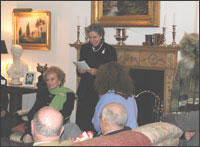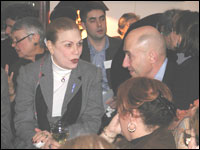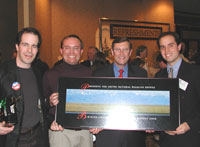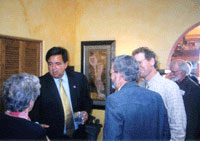Glenn Hurowitz is the associate director of WILD PAC, a political action committee that works to elect leaders at all levels of government who will champion protection of America’s wilderness and public lands.

Monday, 24 Mar 2003
NEW YORK, N.Y.
I’m back from Minnesota. During this past week, I had the great opportunity to meet with conservation, union, and business leaders about the importance of organizing and energizing a conservation community still in shock from the tragic death of Sen. Paul Wellstone (D) and the subsequent loss of the election to Norm Coleman (R). Of course, Minnesota is always about two steps ahead of most of the rest of the country when it comes to political activity, so I was fortunate to be there.
My main purpose in going to Minnesota was to meet with local conservation leaders and supporters and begin organizing for WILD PAC’s second Minnesota event, to be held this June. But I was also there at an extremely fortuitous time, which helped illustrate the importance of WILD PAC’s mission — to help elect wilderness champions.
Last week, the Senate voted on whether or not to include drilling revenue from the Arctic National Wildlife Refuge in the budget — a move that would be a first step toward potentially opening the Arctic Refuge to oil drilling. Sen. Norm Coleman was considered one of four votes that was up for grabs. Even though Sen. Coleman had promised repeatedly both during his campaign and since taking office to vote to protect the Arctic Refuge, in the days before the vote, he was giving off signals that he was less than certain about his promise.
With a close vote in the offing, and Vice President Dick Cheney waiting in the wings to cast a tie-breaking vote for drilling, I joined the Minnesota conservation community with a press event sponsored by the Alaska Coalition of Minnesota. With only a couple of hours notice, we assembled a group of Minnesotans, with TV cameras and reporters in tow, outside Sen. Coleman’s St. Paul office and asked him to keep his campaign promise to protect the Arctic Refuge. We brought with us an enlarged version of a letter Coleman had signed to a constituent in which he pledged his support for protection of the Arctic Refuge. The whole time we were in the office, the phones were ringing off the hook urging Sen. Coleman to vote to protect the Arctic Refuge.
After the vote, Sen. Coleman announced that he had received up to 8,000 phone calls asking him to protect the Arctic Refuge. Sen. Coleman’s vote turned out to be crucial — the final tally was 52-48 in favor of protecting the refuge.
The close vote showed the importance of having wilderness champions in office. A year ago, Sen. Paul Wellstone led the fight in the Senate to protect the Arctic Refuge. Now, the conservation community needs to work hard with Sen. Coleman to ensure that he represents the views of Minnesotans, not the big oil companies.
But the great thing about the political system in America is that we have the opportunity to elect new leaders. In 2004, WILD PAC will be working hard to elect conservation leaders from the president on down to the local level in communities like Minnesota — to organize, energize, and mobilize the conservation community to help elect wilderness and public-lands champions.
Tuesday, 25 Mar 2003
NEW YORK, N.Y.
Last night, WILD PAC put the fun in fundraising. We hosted an event for more than 50 people on Park Avenue, at the home of renowned New York hostess Patti Kenner. With wine, hors d’ouevres, and organic cotton T-shirts donated by Patagonia, glitz combined with, well, more glitz to raise a lot of money to elect pro-wilderness leaders across the country.

Event hostess Patti Kenner introduces Ruth Gruber.
The star of the evening, however, wasn’t the caribou, the polar bears, or even the politicians, but rather, Ruth Gruber, a 90-year-old journalist, author, and adventurer who spoke charmingly about her new memoir, Inside of Time: My Journey from Alaska to Israel. Gruber riveted the audience of glitterati and wilderness lovers with tales of her adventures among Eskimos and naval officers in the Arctic north. She started her career as a globe-trotting journalist, but on the verge of the outbreak of World War II, she found herself meeting with Harold Ickes, FDR’s interior secretary, who urged her to become his personal representative to Alaska, a key area in America’s wartime defense plans. Gruber told of the rumors that swirled around her trip to the Arctic north (including, among others, that she was a spy sent to teach birth control to Eskimos), and her successes in helping the people of the Arctic.
Of course, the Alaska Gruber knew is not the same Alaska that exists today. Oil companies have exploited Alaska’s North Slope, turning much of the fragile tundra into a wasteland, and logging companies have felled many of the oldgrowth trees in the Tongass National Forest — the world’s largest temperate rainforest. Gruber said she wants to preserve the beauty that remains in Alaska, and she displayed a very deep understanding of the role of money in politics. With every adventure tale she told, she concluded with “and that’s why we’re here for WILD PAC tonight.”

Who said wilderness isn’t glamorous? Rita Levin chats with the Honorable Consul General of Sweden, Olle Wastberg, as up-and-coming New Yorker writer Herbert Allen looks on.
The truth is, our event wasn’t all about glamour and schmoozing. It was also about gaining ground on the industries that are destroying our public lands (and using political dollars to grease the wheels of Congress and the Bush administration to allow them to do so). In the last two election cycles, the oil, coal, timber, and other extractive and polluting industries contributed more than $80 million to candidates. In contrast, the entire environmental community only spent about $10 million on elections. From this perspective, it’s no surprise that many politicians ignore Americans’ overwhelming demand for strong protections for wilderness and public lands.
At WILD PAC, we’re working to level the playing field. Events like the one last night are raising much-needed money for pro-wilderness champions. We’ll never be able to match the extractive industries dollar for dollar — but we can out-organize them on the ground using the contributions that we do get. For example, WILD PAC will use the contributions from last night’s event to hire organizers who will mobilize the conservation community on the campaign trail and recruit hundreds of volunteers.
With political pundits anticipating that George W. Bush will raise more than $250 million for his re-election effort, much of it from polluting and extractive industries, the conservation community will need to work harder than ever to fight the influence of the extractive industries’ campaign dollars. With more events like last night’s, we’ll be well on our way.
Wednesday, 26 Mar 2003
NEW YORK, N.Y.
With just 10 months left until the presidential primaries, I’ve been researching and planning ways in which WILD PAC and the conservation community can shine a light on wilderness and public-lands protection during the presidential primaries. No doubt about it, any of the Democratic front-runners would be superior to President Bush. While many of them have led fights to protect wilderness in Congress, Bush has increased the amount of public land open to exploitation from 2.6 million to 4.1 million acres and has pushed to open for exploitation areas next to and in some of our nation’s most treasured parks and monuments. That’s hardly surprising, given the huge campaign donations from the oil, mining, and timber industries — more than $80 million in the last two elections.
So how can WILD PAC help raise awareness of public lands and wilderness protection in the presidential election? First, the national media spotlight will be on the first primary states of New Hampshire and Iowa, as well as other early states such as South Carolina and Arizona. Candidates frequent these states to visit with voters at town meetings, diners, and county fairs. So we’ll go to where the candidates are, whether it’s a fancy dinner or a barbecue, and ask them to take strong positions on key wilderness issues of local and national importance — both to highlight their positions and to raise their awareness of these issues. We’ll knock on doors and call voters to let them know the records of the different candidates. And we’ll make sure that the candidates’ wilderness records — and voters’ concerns about these issues — get into the media.
One state we’re looking at very closely is Arizona. As the first western state to have a primary, it provides a great opportunity to discuss these issues; with many wild areas and lots of public land, wilderness issues are of great importance in this state. Arizona is also the home of Sen. John McCain (R), who understands what environmental activists can do to raise important issues. In 2000, environmental activists with Ozone Action followed McCain and the other presidential candidates around New Hampshire, asking them about their plans to stop global warming. Finally, McCain admitted that he didn’t have a plan, but he promised to make one. When he got back to Washington, he held hearings on global warming and has since vastly improved his environmental voting record — criticizing Bush for his inaction on global climate deterioration, sponsoring legislation with Sen. John Kerry (D-Mass.) to raise fuel-efficiency standards for cars and trucks, and even voting to protect Alaska’s Arctic National Wildlife Refuge from the devastating impact of oil drilling.
We hope that similar work on wilderness issues will lead to the selection of a pro-wilderness champion from the primary process to challenge Bush. We also hope that this work early in the presidential season pays off later in the general election — when voters remember the positions that the candidates took in key states and use that information to decide how to cast their votes.
Thursday, 27 Mar 2003
NEW YORK, N.Y.
Today, I worked on one of WILD PAC’s most exciting efforts — a project to plant conservation firmly on both of our major political parties’ agendas. It will involve lots of tough, grassroots organizing, but could pay off in both the immediate future and in the long run with parties and candidates strongly committed to the protection of public lands, wilderness, and the environment.
In conjunction with other national and local conservation groups, we’re planning a national organizing effort to mobilize the millions of conservationists in this country into a powerful political force. For too long, the tens of millions of dollars in campaign donations from the oil, timber, and mining industries have influenced candidates across the country. These special interests throw fancy parties at political conventions and provide generous financial support to candidates who agree to advance their agenda. Butwe have a powerful force on the side of conservation: democracy. Although money can play a powerful role in the selection of candidates, our parties are basically democratic: Ultimately it’s the voters who choose nominees.
However, in many cases, this is not a democracy of all the people, but rather a democracy of those who show up. Although rules vary from state to state, most states hold county- or-district wide nominating meetings or caucuses. These groups often decide a party’s choice for a state assembly or state senate nominee, as well as choose the delegates to the state party convention. In most cases, any registered party member can participate in the process. Attendance is often low, meaning that a little bit of grassroots organizing to turn out conservationists can have a big pay off.
A well-organized bloc can often choose the party nominee from among its own members. They can also choose the district party officials. This is the party apparatus that gets to dispense party funds, recruit candidates, and represent the party to the public. District party officials play important roles at the conventions. Presidential candidates court their endorsement. Office-holders turn to them for policy guidance. In short, they represent the feelings of the party and the office holder’s base.
I’ve had personal experience with how one person’s involvement in a convention can bring great results. Last year, I lived in North Dakota and organized citizens to encourage Sen. Kent Conrad (D) to vote to protect Alaska’s Arctic National Wildlife Refuge. Though I hadn’t been in the state for a very long time, I was there long enough to meet the residency requirement for participation in the state Democratic convention. I started by going to our district nominating convention in Bismarck — a meeting of about 35 people in a public school. They had recently selected the district party chair in a closely contested election in which a few more people showing up for either side would have made a decisive difference. The people who were present nominated candidates for state assembly and passed a platform. Finally, they chose a delegation to the state convention. Everybody who wanted to be a delegate was chosen — and the slate wasn’t even filled, leaving it up to the party chair to fill the remaining slots.

North Dakota state Rep. Scot Kelsh (D), Alaska Coaltion organizer Scott Hed, Senator Kent Conrad (D), and Glenn Hurowitz.
At the convention a few weeks later, I had incredible opportunities to further a pro-conservation agenda. I was able to talk to Sens. Conrad and Byron Dorgan (D) and present them with a picture of the Arctic Refuge signed by many of the delegates (delegates who formed their political base and had the power to choose the Democrats’ nominee for Senate).
But better than the access were the results. Working with a handful of other pro-conservation delegates, I was able to organize a floor vote to strip the platform of a long-standing plank urging the abolition of the Endangered Species Act, and insert a plank urging a clean energy future. Both passed overwhelmingly. The vote apparently caught the attention of many office holders and candidates, because pretty soon they were coming up to me to tell me how pro-environment they were in hopes that I would swing my “bloc” of voters to them. And their commitment lasted beyond the convention. When I called them to follow up afterwards, they were a lot quicker to take my calls than they had previously been — and their conservation positions improved as well.
Of course, I didn’t really have a bloc; just myself and those sympathetic delegates I could find. The whole time I was at the convention, I was thinking how great it would be to actually have an organized bloc pursuing a common agenda and how far that could go toward furthering conservation issues in politics and ultimately electing conservation champions to office. Many others have had similar feelings, so WILD PAC is working with other groups to make that vision a reality in 2004, on the local, state, and national levels.
Right now, we’re in the research stage. My interns and I have been working the phones, calling state parties across the country to organize the often intricate rules and regulations into an easy-to-understand, state-by-state manual that organizers and delegates can use to navigate the road — from an initial organizing meeting to the selection of a pro-wilderness champion as a nominee for office. It’s hard work, but it will pay off with a template for organizing the conservation community for the first time in nearly two decades.
Friday, 28 Mar 2003
NEW YORK, N.Y.
Presidents and congress members aren’t the only people who decide the fate of our public lands. Governors, state legislators, and local officials are also key players in the destiny of our lands. Not only do they directly control the significant quantities of land owned by state governments, they also have tremendous influence over the federal government’s decisions about wilderness protection. The fate of most wilderness bills is decided by the support (or lack thereof) of that state’s congressional delegation. When a congressional delegation unanimously supports designation of a critical area in the state as wilderness, it’s very likely to pass and be signed by the president — no matter who the president is. When the congressional delegation opposes wilderness designation, support among the rest of Congress has to be extremely strong to pass a bill.
As a result, state politics can play an extremely important role. Congress looks to state and local elected officials when seeking input on decisions affecting those states. And even the Bush administration is hesitant (though by no means unwilling) to push drilling, mining, or logging against the wishes of state leaders. As a result, WILD PAC will be focusing half of our efforts and resources on electing state and local leaders across the country who will champion wilderness protection in their states.

Bill Richardson at a WILD PAC event in New Mexico.
That’s why I’ve been calling state conservation leaders in the last few days looking for opportunities to support pro-wilderness champions in races for state and local office. That work has delivered tremendous results in the past. In the 2002 elections, one of WILD PAC’s biggest victories was electing Bill Richardson (D) as governor of New Mexico. We endorsed Richardson and organized New Mexico’s conservation community to create a coalition called “Conservationists for Bill Richardson,” bringing local volunteers into the Richardson campaign. We focused our efforts on highlighting the difference between Richardson’s position and that of his opponent on an important state wilderness issue: whether to protect Otero Mesa or open it up to drilling.
Otero Mesa is the largest intact segment of Chihuahuan desert grassland in North America, and the Bush administration had targeted it for destructive oil drilling. We ran a full page ad in one of the state’s biggest newspapers in the final weeks of the race, pointing out the clear differences between the candidates on this issue. With the help from WILD PAC, the issue of whether to drill in Otero Mesa was discussed in every public debate (including a nationally televised one) between the candidates. Now that he’s in office, Richardson has enthusiastically lived up to his promises and championed protection of Otero Mesa, going so far as to write Interior Secretary Gale Norton to urge her to stop efforts to exploit the mesa. He even urged the Interior Department to recommend designating the land as wilderness. Richardson hasn’t confined his efforts to New Mexico: He promises to be a strong voice for wilderness within the Western Governors’ Association as well.
With only 3 percent of land in the lower 48 states protected as wilderness and the Bush administration aggressively pushing plans to exploit many unprotected wild lands, WILD PAC will be working hard to elect state and local officials like Richardson who will champion protection of America’s endangered public lands.

